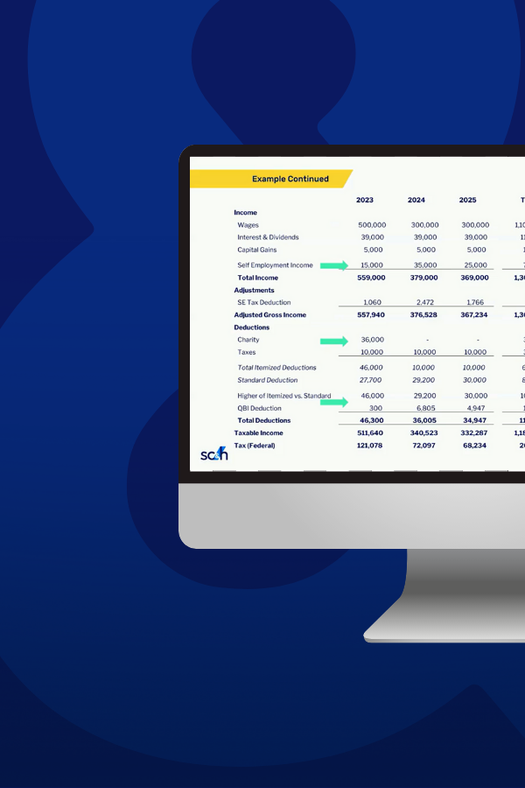Authored by Greg Hogan, ASA | Managing Director, SC&H Capital
The M&A appetite for companies in the lower middle market tends to be strong, driven in part by private equity sponsors who are hungry for acquisition opportunities. Private equity-backed platform companies often execute roll-up strategies in various industries across the country. As a result, business owners can receive unprecedented levels of inbound interest from prospective buyers seeking to engage them in discussions about potential acquisitions. Assuming there is a mutual interest, buyers will often request certain financial and operational data from the business owner to evaluate the opportunity and develop an offer or letter of intent (“LOI”).
Although LOIs are largely non-binding legal documents, they are used as the guidelines for the economics and structure of any subsequent transaction, subject to the buyer’s due diligence. Thus, it is important for potential sellers to negotiate the transaction terms described in an LOI vigorously and be comfortable with the counterparty’s ability to execute and close the transaction before signing an LOI.
Before considering how to negotiate and/or whether to sign an LOI, you should be able to answer these six questions:
#1 — What is my Adjusted EBITDA and Why Does It Matter?
Valuations in the lower middle market are often determined as a multiple of EBITDA (Earnings Before Interest Tax Depreciation and Amortization). However, this is not a financial metric that should be calculated directly from the profit and loss statement. Often in privately held companies, there are substantial adjustments that should be considered as addbacks to the reported EBITDA to determine a “normalized” EBITDA for the business. Common adjustments include the owner’s compensation, discretionary expenses, and certain extraordinary and/or non-recurring expenses. A close inspection of the profit and loss statement of the business should be done to identify and addback any such expenses in arriving at the normalized EBITDA. This process nearly always results in increased levels of EBITDA and thus, higher valuations.
#2 — Valuation: Is the EBITDA Multiple Fair and How Does it Compare to Recent Market Transactions?
Once the adjusted EBITDA is determined, buyers will then apply a multiple to that EBITDA in arriving at the total valuation for the business. Different buyers can have widely different opinions as to what is the appropriate EBITDA multiple to apply to a business. It is a subjective judgment based on several factors including size, growth rates, earnings margins, revenue composition, quality of employee base, geographic footprint, and customer concentration. Certainly, not all companies are valued equally. However, given the abundance of recent M&A activity, there are usually data points available that can provide substantive guidance as to whether the offer being considered is a fair one.
#3 — What is a Proceeds Waterfall?
An LOI from a buyer will likely include an offer to acquire the business for a certain enterprise value. However, this enterprise value is not necessarily what the sellers will actually receive at closing. There are a number of obligations and expenses that will be paid out of, or deducted from, the stated enterprise value. For example, the interest-bearing debt of the company will need to be repaid, certain transaction expenses paid, and escrow accounts funded. In addition, if the seller is rolling over equity or providing financing as a part of the transaction, these amounts would be deducted from closing proceeds. All these items should be determined and a calculation of the estimated waterfall of proceeds calculated to estimate the cash that would be received by the shareholders at closing.
#4 — What are the Implications of a Deal Structure?
Acquisitions can be structured as asset or stock acquisitions and the choice can have significant tax and other transaction implications. Generally, buyers prefer to buy assets to obtain a step up in the tax basis of the acquired assets; on the other hand, sellers prefer to sell stock to maximize capital gain treatment and minimize post-transaction liabilities. Understanding the tax implications of either option is important to consider in connection with an analysis of the stated valuation. Deal structure can also impact customer contracts if they contain change in control provisions or customer consent rights. A review of key agreements is wise before agreeing to a deal structure.
#5 — Have All Potential Buyers Been Considered?
Buyers will often try to negotiate quickly and directly with an owner to get a potential acquisition under LOI prior to the owner fully considering other options. However, there are normally multiple well-funded buyers that are actively seeking acquisition opportunities in any given industry. Shareholders should understand the current M&A landscape and consider whether approaching other potential buyers to create competitive tension in a structured process may maximize the probability of achieving the best possible outcome based upon their specific goals.
#6 — Is a Platform or Add-on Acquisition Preferred?
Private equity interest has rarely been higher as sponsors continue to make platform investments across all industries and actively look for add-ons. Being acquired as the platform acquisition versus an add-on can significantly impact the transaction terms, deal structure, and post-transaction roles for owners and management. A clear understanding of these issues and their impact will provide for a better decision regarding which potential buyers would be best to achieve shareholder goals.
Are You Considering a Sale? Have You Been Approached by a Buyer?
Consider partnering with an experienced investment banking firm focused on the planning, understanding, and positioning of your business throughout the transaction lifecycle to assure the best advice and counsel every step of the way. Our team has completed over 800 M&A advisory, financing, restructuring, and ESOP transactions across a variety of industries with an aggregate economic value of over $11 billion. Below are select industry-based transactions we’ve completed:
-
Chamberlain Contractors
Manufacturing | Maintenance-Focused Paving
Our team advised Chamberlain Contracts in its successful sale to Pavement Partners. Our team worked closely with Chamberlain’s management team to competitively position the Company for acquisition by preparing information for potential bidders, implementing a structured bidding process with prospective acquirers, and evaluating and negotiating offers to achieve a premium valuation for the shareholders.
-
Insight Policy Research
Government Contracting | Policy Research
Given the high-quality, differentiated services offered by Insight, its founders received various inquiries over the years from potential strategic acquirers. When they were contacted by Westat, a long-time teaming partner and well-respected competitor with interest in bringing the two companies’ capabilities together, the founders were intrigued by the possibility but unsure about how to proceed with acquisition discussions. Insight’s founders engaged the SC&H Capital team to assist with the potential transaction, shed light on the market value of the company, assess and negotiate the terms of the transaction, and support the company through diligence to closing. -
West Physics
Healthcare | Medical Physics
Our team served as the exclusive financial advisor and guided West Physics through a recapitalization by LNC Partners, a private equity firm that had previously communicated interest in the industry. We managed negotiations with the buyer from initial contact to closing and ensured an efficient diligence process by preparing with the client in advance of the process. LNC Partners’ familiarity with the industry made for a smooth diligence and closing process and, most importantly, allows them to be true partners in the future growth of West Physics.
Our investment banking team would welcome the opportunity to guide you.





